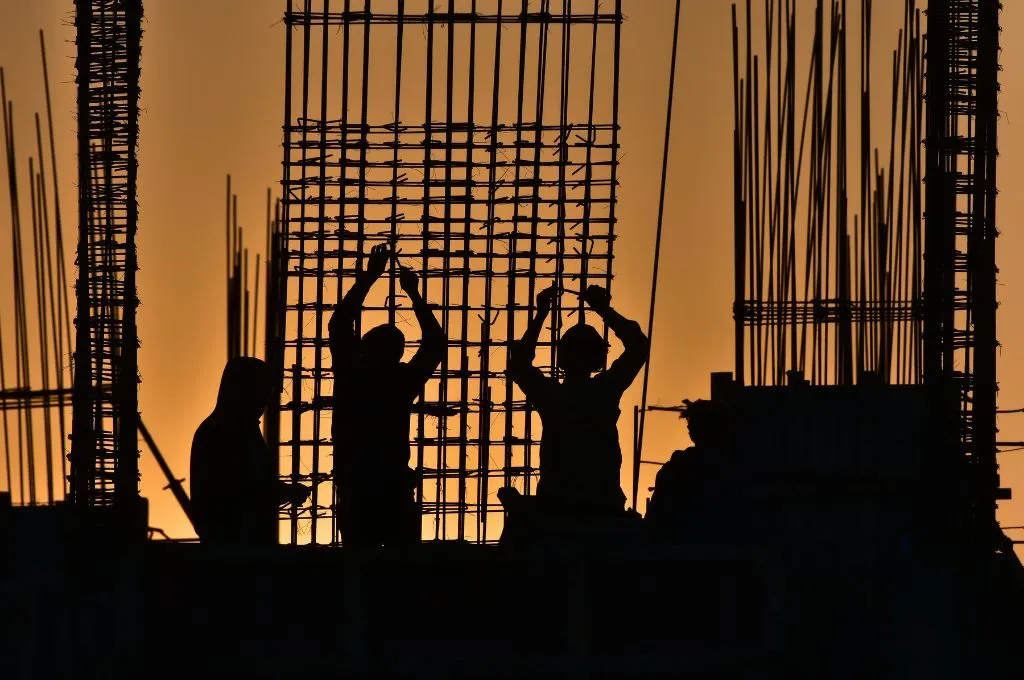Narol is among the largest industrial clusters in Ahmedabad Municipal Corporation’s South Zone. It houses approximately 2,000 enterprises that cater to specific garment processes such as washing, dyeing, bleaching, spraying, denim finishing, and printing. All these enterprises are informal and operate on a subcontract basis, which means that there is a long chain of contractors between the principal employer and the floor worker.
A shop-floor worker is in contact with only his petty contractor, an agent assigned by a higher-level contractor to source labour. In essence, these enterprises function as unregistered shop floors, each of which employs 20–30 workers who operate three or four machines within a unit. The workers are answerable to their direct petty contractor and not the company’s management or the primary employer. A common thread connecting these business set-ups and trades is the ‘boiler’, a furnace-type container that generates steam, necessary at every step of garment processing.
The boilers are required to operate all the time, except during maintenance, which means that the operators must work overtime. Since these boilers continuously produce high levels of heat and smoke, they can be hazardous to the workers’ health. Moreover, there are other risk factors such as explosions and burns.
This photo essay provides a glimpse into the lives of those employed in Narol’s boiler industry and shows how the workers’ socio-economic backgrounds and the informal nature of their work heighten the challenges in their lives.

Migrant workers, informal labour, and poor pay
Boiler work is typically carried out by seasonal migrant workers—hired on contract by petty contractors—belonging to scheduled tribes and denotified tribes. They mostly come from the border districts of Gujarat, Madhya Pradesh, and Rajasthan. A majority are landless labourers who migrate to cities like Ahmedabad to earn a meagre but continuous income, which isn’t available at their native place. They migrate with their families and their spouses usually work with them in these factories. Even when they go back to their villages during the agricultural season, they are employed as farm labourers in other people’s fields. There’s also no guarantee that their factory job will be secure when they return because their employment hinges on a verbal contract spanning six months to a year.
The contractor provides the workers a kharchi (advance) at the time of joining, and the remaining amount is paid in the first week of the month. These workers are paid below the minimum wage of INR 11,752 per month as required by law in Gujarat. The amount is much lower than the earnings of the workers involved in the processes at the higher end of garment manufacturing—such as dyeing, printing, and washing—who easily earn INR 14,000–16,000 a month. Further, boiler workers are forced to work for more than 12 hours instead of the mandated eight hours, and there is no compensation for overtime labour. They also lack the social security coverage provided by measures such as employees’ state insurance and provident fund.

Hazards in the workplace and hazards at home
Usually, the boiler workers are at the bottom of the socio-economic hierarchy at the workplace—they are from the most marginalised caste groups and do not have access to many educational and livelihood opportunities. The main reason they work in boilers is to maximise their income—they save on rent by living in on-site colonies—while holding a flexible job.
Non-unionised workers often don’t complain about the sheer dearth of safety protocols in the factories as they fear being terminated by employers. For operating a boiler with a capacity of two tonnes, four families are hired to work in two shifts. Men hand-fire the fuel, typically wood or coal; they stand near the 400–450-degree furnace and are continuously exposed to heat, smoke, and dust for long hours. Manual tasks such as cutting the wood into smaller pieces, carrying the fuel to the furnace, and ash disposal are taken up by women, exposing them to dust particles, charcoal, and ash, which is harmful to their health. Children roam around the factories unmonitored, as both spouses are involved in the work. There is also a risk of the boilers exploding and causing fires if they are not maintained and repaired periodically.
Chanda*, a 27-year-old boiler worker, says, “Women lend a helping hand to men as the wages earned by them are not sufficient to run the household. Women workers do not have privacy—we are harassed at worksites—and we’re paid half of what the men receive. We also have to cook the food, buy essentials, wash clothes and utensils, and look after the children.”

In larger and safer factories, the boilers run on low-emission fuel such as compressed natural gas (CNG), and an operator is needed only to monitor the fuel supply and set the temperature of the furnace. But such boilers with upgraded technology are not common in Narol, where even the operation, repair, and maintenance of the machines are outsourced to the contractors. These contractors lack connections with manufacturers of machines with better technology. Even if they know such manufacturers, they hesitate to reach out because such technology could replace the labour force and potentially lead to a loss of work for them.
Women’s health is even more precarious than that of the men in the household.
The workers reside in a temporary on-site structure that can be easily dismantled if the enterprise shuts down or is relocated. This structure is made of cheap material such as asbestos, brass, or sometimes steel; it is dingy and not well ventilated, so it remains dark, hot, and humid. In the factories, the workers are constantly exposed to hazardous conditions, and at home they lack a hygienic environment, which eventually contributes to them developing long-term illnesses. The burden of domestic work is solely upon women, and since they are engaged in both paid and unpaid labour for longer durations, their health is even more precarious than that of the men in the household.
Dr R K Prasad, a family medicine specialist and an educator at Basic Healthcare Services, a nonprofit that works on the health of marginalised communities, observes, “An individual working in boilers must be hardly consuming 800 calories a day, whereas they must be burning approximately 2,000 calories at work. This diminishes their quality of life over time. All the women working in the boilers [and the children of the workers] are severely malnourished. Some of the workers may have developed pneumoconiosis or ‘black lung disease’, which is caused by the chronic inhalation of coal dust over a long period of time.”

Union-led advocacy for more bargaining power
Section 4 of Boiler Operation Rules, 2021, mandates that a boiler operation engineer has to either directly be in charge of boiler operation or appoint an attendant. Additionally, Section 7 of the rules requires such personnel to be physically present within 100 metres of the boilers. A survey of 25 enterprises was undertaken by Karkhana Shramik Suraksha Sangh (KSSS), a registered trade union that focuses on the rights and entitlements of migrant workers employed in factories in Ahmedabad. The survey revealed that enterprises that have an operating boiler weren’t complying with either of these rules. It also showed that most factories violated regulations concerning wages, social security, overtime, and mandated working hours. The workers were not provided with safety gear such as masks, gloves, or boots; no officers were appointed or committees constituted to avert or respond to worksite emergencies or accidents in a timely manner; and there were no separate toilets for women or a day-care space for children. KSSS now provides preparedness training and legal literacy around rights and entitlements of the workers, supports them in mediation of industrial disputes with owners and contractors, and helps facilitate advocacy with various departments under the state and local governments.
The members of KSSS are a mixed group of shop-floor workers, including those in boilers, dyeing, printing, washing, stitching, and packaging, as well as petty contractors. Those petty contractors who are members of the union understand and empathise with the struggles of shop-floor workers, and they align with the union’s goals of advancing the rights and entitlements of Ahmedabad’s informal migrant workers.
The workers have now taken various issues to the Directorate of Industrial Safety and Health (DISH), the regional director of Employees’ State Insurance Corporation (ESIC), and the office of Directorate of Boilers, Gujarat. At present, DISH has issued notices to 11 enterprises for wage violations. ESIC too has agreed to inspect and penalise enterprises that do not provide workers with employees’ state insurance cover.

Madanlal,* a 37-year-old petty contractor at a boiler site and KSSS member, says, “Several enterprises, including the one for which I work, underwent boiler inspections after the union submitted a letter demanding the same. Later, the labour department also called for a meeting of all the boiler operators in one of the enterprises and an officer conducted a session on safety protocols. This was a result of the union’s advocacy.”
*Names changed to maintain confidentiality.
—
Know more
- Read this article to learn more about the difficult lives of the boiler workers in Gujarat’s fabric industry.
- Read this article to understand why India’s garment factories need women leaders.





